场景
我们考虑一下下边的代码会输出什么。
import { observe } from "./reactive";
import Watcher from "./watcher";
const data = {
text: "hello, world",
ok: true,
};
observe(data);
const updateComponent = () => {
console.log("收到", data.ok ? data.text : "not");
};
new Watcher(updateComponent); // updateComponent 执行一次函数,输出 hello, world
data.ok = false; // updateComponent 执行一次函数,输出 not
data.text = "hello, liang"; // updateComponent 会执行吗?- 1.
- 2.
- 3.
- 4.
- 5.
- 6.
- 7.
- 8.
- 9.
- 10.
- 11.
- 12.
- 13.
- 14.
- 15.
- 16.
- 17.
我们来一步一步理清:
observer(data)
拦截了 data 中 text 和 ok 的 get、set,并且各自初始化了一个 Dep 实例,用来保存依赖它们的 Watcher 对象。
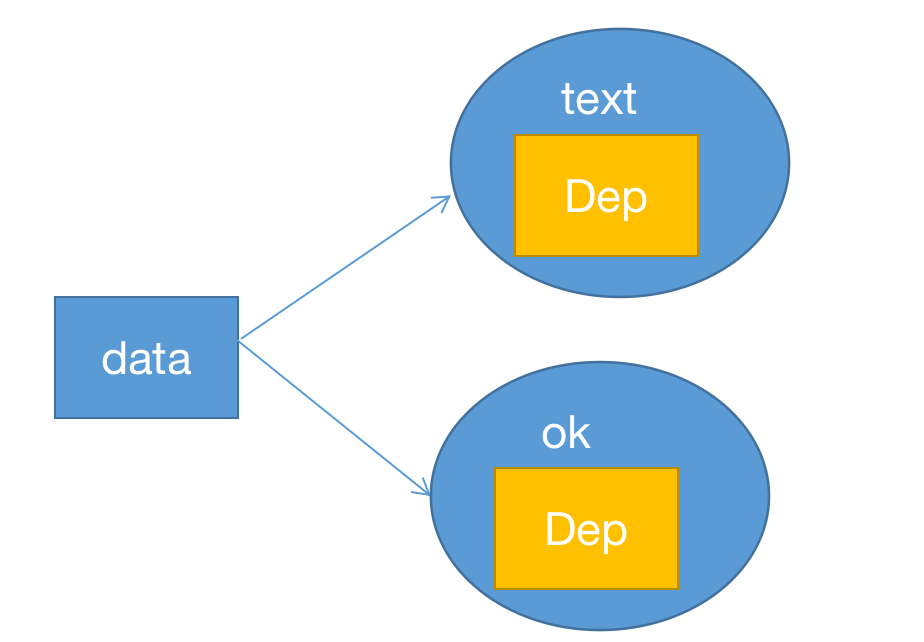
new Watcher(updateComponent);
这一步会执行 updateComponent 函数,执行过程中用到的所有对象属性,会将 Watcher 收集到相应对象属性中的Dep 中。
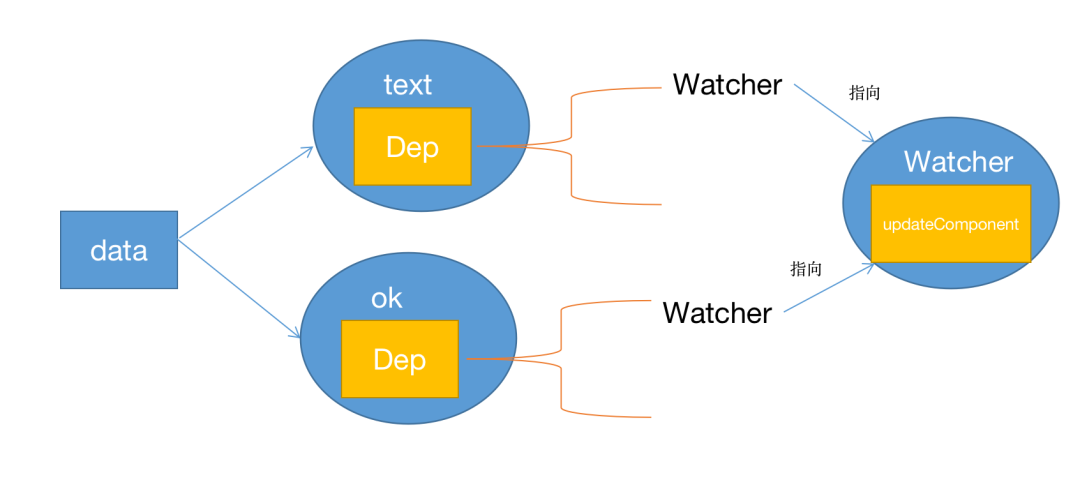
当然这里的 Watcher 其实是同一个,所以用了指向的箭头。
data.ok = false;
这一步会触发 set ,从而执行 Dep 中所有的 Watcher ,此时就会执行一次 updateComponent 。
执行 updateComponent 就会重新读取 data 中的属性,触发 get,然后继续收集 Watcher 。
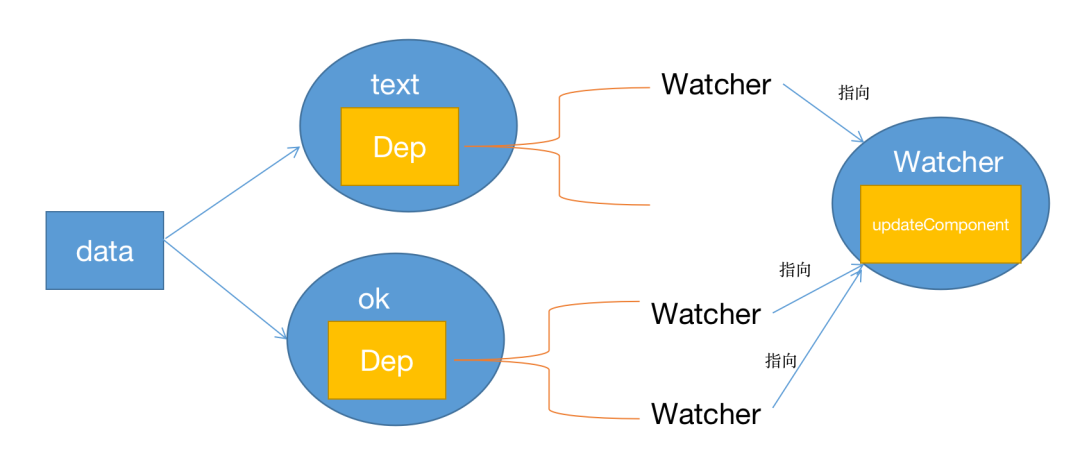
重新执行 updateComponent 函数 的时候:
const updateComponent = () => {
console.log("收到", data.ok ? data.text : "not");
};- 1.
- 2.
- 3.
因为 data.ok 的值变为 false ,所以就不会触发 data.text 的 get ,text 的 Dep 就不会变化了。
而 data.ok 会继续执行,触发 get 收集 Watcher ,但由于我们 Dep 中使用的是数组,此时收集到的两个 Wacher 其实是同一个,这里是有问题,会导致 updateComponent 重复执行,一会儿我们来解决下。
data.text = "hello, liang";
执行这句的时候,会触发 text 的 set,所以会执行一次 updateComponent 。但从代码来看 updateComponent 函数中由于 data.ok 为 false,data.text 对输出没有任何影响,这次执行其实是没有必要的。
之所以执行了,是因为第一次执行 updateComponent 读取了 data.text 从而收集了 Watcher ,第二次执行 updateComponent 的时候,data.text 虽然没有读到,但之前的 Watcher 也没有清除掉,所以这一次改变 data.text 的时候 updateComponent 依旧会执行。
所以我们需要的就是当重新执行 updateComponent 的时候,如果 Watcher 已经不依赖于某个 Dep 了,我们需要将当前 Watcher 从该 Dep 中移除掉。
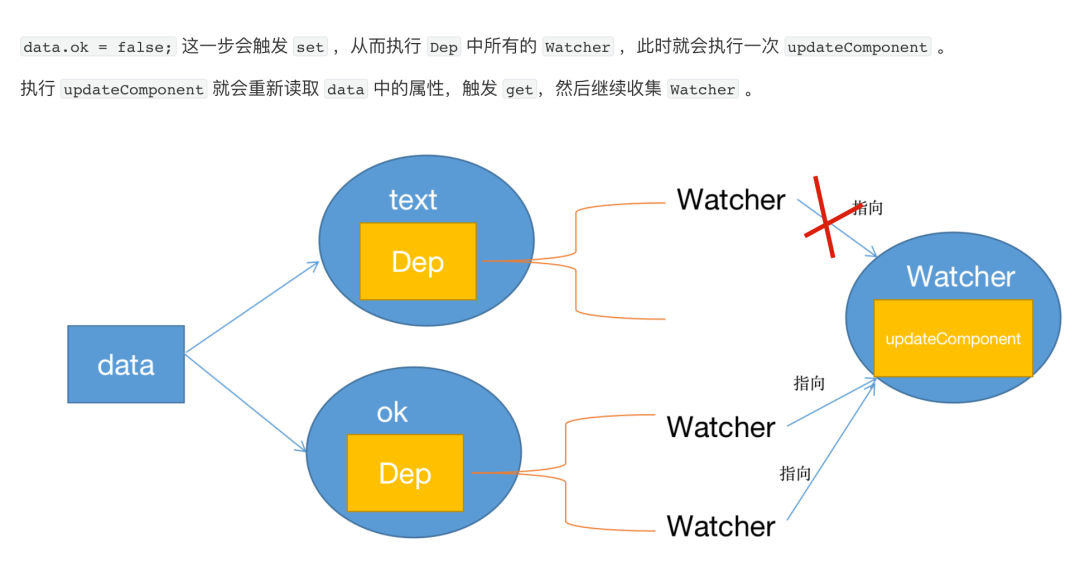
问题
总结下来我们需要做两件事情。
- 去重,Dep 中不要重复收集 Watcher 。
- 重置,如果该属性对 Dep 中的 Wacher 已经没有影响了(换句话就是,Watcher 中的 updateComponent 已经不会读取到该属性了 ),就将该 Watcher 从该属性的 Dep 中删除。
去重
去重的话有两种方案:
- Dep 中的 subs 数组换为 Set。
- 每个 Dep 对象引入 id ,Watcher 对象中记录所有的 Dep 的 id,下次重新收集依赖的时候,如果 Dep 的 id 已经存在,就不再收集该 Watcher 了。
Vue2 源码中采用的是方案 2 这里我们实现下:
Dep 类的话只需要引入 id 即可。
/*************改动***************************/
let uid = 0;
/****************************************/
export default class Dep {
static target; //当前在执行的函数
subs; // 依赖的函数
id; // Dep 对象标识
constructor() {
/**************改动**************************/
this.id = uid++;
/****************************************/
this.subs = []; // 保存所有需要执行的函数
}
addSub(sub) {
this.subs.push(sub);
}
depend() {
if (Dep.target) {
// 委托给 Dep.target 去调用 addSub
Dep.target.addDep(this);
}
}
notify() {
for (let i = 0, l = this.subs.length; i < l; i++) {
this.subs[i].update();
}
}
}
Dep.target = null; // 静态变量,全局唯一
- 1.
- 2.
- 3.
- 4.
- 5.
- 6.
- 7.
- 8.
- 9.
- 10.
- 11.
- 12.
- 13.
- 14.
- 15.
- 16.
- 17.
- 18.
- 19.
- 20.
- 21.
- 22.
- 23.
- 24.
- 25.
- 26.
- 27.
- 28.
- 29.
- 30.
- 31.
- 32.
在 Watcher 中,我们引入 this.depIds 来记录所有的 id 。
import Dep from "./dep";
export default class Watcher {
constructor(Fn) {
this.getter = Fn;
/*************改动***************************/
this.depIds = new Set(); // 拥有 has 函数可以判断是否存在某个 id
/****************************************/
this.get();
}
/**
* Evaluate the getter, and re-collect dependencies.
*/
get() {
Dep.target = this; // 保存包装了当前正在执行的函数的 Watcher
let value;
try {
value = this.getter.call();
} catch (e) {
throw e;
} finally {
this.cleanupDeps();
}
return value;
}
/**
* Add a dependency to this directive.
*/
addDep(dep) {
/*************改动***************************/
const id = dep.id;
if (!this.depIds.has(id)) {
dep.addSub(this);
}
/****************************************/
}
/**
* Subscriber interface.
* Will be called when a dependency changes.
*/
update() {
this.run();
}
/**
* Scheduler job interface.
* Will be called by the scheduler.
*/
run() {
this.get();
}
}
- 1.
- 2.
- 3.
- 4.
- 5.
- 6.
- 7.
- 8.
- 9.
- 10.
- 11.
- 12.
- 13.
- 14.
- 15.
- 16.
- 17.
- 18.
- 19.
- 20.
- 21.
- 22.
- 23.
- 24.
- 25.
- 26.
- 27.
- 28.
- 29.
- 30.
- 31.
- 32.
- 33.
- 34.
- 35.
- 36.
- 37.
- 38.
- 39.
- 40.
- 41.
- 42.
- 43.
- 44.
- 45.
- 46.
- 47.
- 48.
- 49.
- 50.
- 51.
- 52.
- 53.
- 54.
- 55.
重置
同样是两个方案:
- 全量式移除,保存 Watcher 所影响的所有 Dep 对象,当重新收集 Watcher 的前,把当前 Watcher 从记录中的所有 Dep 对象中移除。
- 增量式移除,重新收集依赖时,用一个新的变量记录所有的 Dep 对象,之后再和旧的 Dep 对象列表比对,如果新的中没有,旧的中有,就将当前 Watcher 从该 Dep 对象中移除。
Vue2 中采用的是方案 2,这里也实现下。
首先是 Dep 类,我们需要提供一个 removeSub 方法。
import { remove } from "./util";
/*
export function remove(arr, item) {
if (arr.length) {
const index = arr.indexOf(item);
if (index > -1) {
return arr.splice(index, 1);
}
}
}
*/
let uid = 0;
export default class Dep {
static target; //当前在执行的函数
subs; // 依赖的函数
id; // Dep 对象标识
constructor() {
this.id = uid++;
this.subs = []; // 保存所有需要执行的函数
}
addSub(sub) {
this.subs.push(sub);
}
/*************新增************************/
removeSub(sub) {
remove(this.subs, sub);
}
/****************************************/
depend() {
if (Dep.target) {
// 委托给 Dep.target 去调用 addSub
Dep.target.addDep(this);
}
}
notify() {
for (let i = 0, l = this.subs.length; i < l; i++) {
this.subs[i].update();
}
}
}
Dep.target = null; // 静态变量,全局唯一
- 1.
- 2.
- 3.
- 4.
- 5.
- 6.
- 7.
- 8.
- 9.
- 10.
- 11.
- 12.
- 13.
- 14.
- 15.
- 16.
- 17.
- 18.
- 19.
- 20.
- 21.
- 22.
- 23.
- 24.
- 25.
- 26.
- 27.
- 28.
- 29.
- 30.
- 31.
- 32.
- 33.
- 34.
- 35.
- 36.
- 37.
- 38.
- 39.
- 40.
- 41.
- 42.
- 43.
- 44.
- 45.
然后是 Watcher 类,我们引入 this.deps 来保存所有的旧 Dep 对象,引入 this.newDeps 来保存所有的新 Dep 对象。
import Dep from "./dep";
export default class Watcher {
constructor(Fn) {
this.getter = Fn;
this.depIds = new Set(); // 拥有 has 函数可以判断是否存在某个 id
/*************新增************************/
this.deps = [];
this.newDeps = []; // 记录新一次的依赖
this.newDepIds = new Set();
/****************************************/
this.get();
}
/**
* Evaluate the getter, and re-collect dependencies.
*/
get() {
Dep.target = this; // 保存包装了当前正在执行的函数的 Watcher
let value;
try {
value = this.getter.call();
} catch (e) {
throw e;
} finally {
/*************新增************************/
this.cleanupDeps();
/****************************************/
}
return value;
}
/**
* Add a dependency to this directive.
*/
addDep(dep) {
const id = dep.id;
/*************新增************************/
// 新的依赖已经存在的话,同样不需要继续保存
if (!this.newDepIds.has(id)) {
this.newDepIds.add(id);
this.newDeps.push(dep);
if (!this.depIds.has(id)) {
dep.addSub(this);
}
}
/****************************************/
}
/**
* Clean up for dependency collection.
*/
/*************新增************************/
cleanupDeps() {
let i = this.deps.length;
// 比对新旧列表,找到旧列表里有,但新列表里没有,来移除相应 Watcher
while (i--) {
const dep = this.deps[i];
if (!this.newDepIds.has(dep.id)) {
dep.removeSub(this);
}
}
// 新的列表赋值给旧的,新的列表清空
let tmp = this.depIds;
this.depIds = this.newDepIds;
this.newDepIds = tmp;
this.newDepIds.clear();
tmp = this.deps;
this.deps = this.newDeps;
this.newDeps = tmp;
this.newDeps.length = 0;
}
/****************************************/
/**
* Subscriber interface.
* Will be called when a dependency changes.
*/
update() {
this.run();
}
/**
* Scheduler job interface.
* Will be called by the scheduler.
*/
run() {
this.get();
}
}
- 1.
- 2.
- 3.
- 4.
- 5.
- 6.
- 7.
- 8.
- 9.
- 10.
- 11.
- 12.
- 13.
- 14.
- 15.
- 16.
- 17.
- 18.
- 19.
- 20.
- 21.
- 22.
- 23.
- 24.
- 25.
- 26.
- 27.
- 28.
- 29.
- 30.
- 31.
- 32.
- 33.
- 34.
- 35.
- 36.
- 37.
- 38.
- 39.
- 40.
- 41.
- 42.
- 43.
- 44.
- 45.
- 46.
- 47.
- 48.
- 49.
- 50.
- 51.
- 52.
- 53.
- 54.
- 55.
- 56.
- 57.
- 58.
- 59.
- 60.
- 61.
- 62.
- 63.
- 64.
- 65.
- 66.
- 67.
- 68.
- 69.
- 70.
- 71.
- 72.
- 73.
- 74.
- 75.
- 76.
- 77.
- 78.
- 79.
- 80.
- 81.
- 82.
- 83.
- 84.
- 85.
- 86.
- 87.
- 88.
- 89.
测试
回到开头的代码:
import { observe } from "./reactive";
import Watcher from "./watcher";
const data = {
text: "hello, world",
ok: true,
};
observe(data);
const updateComponent = () => {
console.log("收到", data.ok ? data.text : "not");
};
new Watcher(updateComponent); // updateComponent 执行一次函数,输出 hello, world
data.ok = false; // updateComponent 执行一次函数,输出 not
data.text = "hello, liang"; // updateComponent 会执行吗?
- 1.
- 2.
- 3.
- 4.
- 5.
- 6.
- 7.
- 8.
- 9.
- 10.
- 11.
- 12.
- 13.
- 14.
- 15.
- 16.
- 17.
此时 data.text 修改的话就不会再执行 updateComponent 了,因为第二次执行的时候,我们把 data.text 中 Dep 里的 Watcher 清除了。
总结
今天这个主要就是对响应式系统的一点优化,避免不必要的重新执行。所做的事情就是重新调用函数的时候,把已经没有关联的 Watcher 去除。
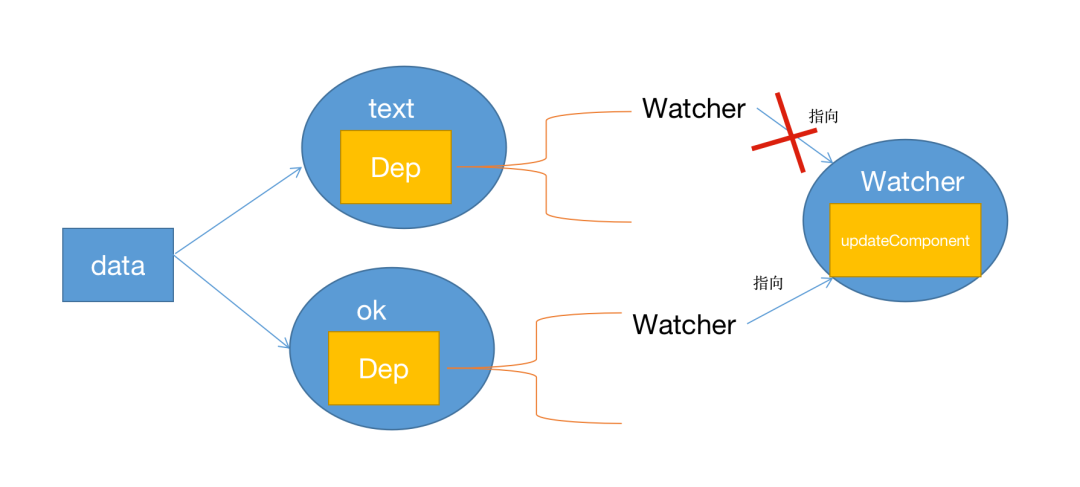
不知道看到这里大家有没有一个疑问,我是一直没想到说服我的点,欢迎一起交流:
在解决去重问题上,我们是引入了 id ,但如果直接用 set 其实就可以。在 Watcher 类中是用 Set 来存 id ,用数组来存 Dep 对象,为什么不直接用 Set 来存 Dep 对象呢?









































